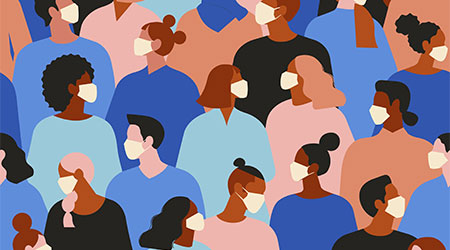With more and more people getting vaccinated in the US, it appears like the end to the quarantine experience is just around the corner. Some dealt with the emotional toll of the pandemic by finding new creative outlets, such as baking bread, socially-distanced nature walks, picking up new hobbies, maybe even writing a book. But not all people experienced the pandemic in the same way. With a death toll of over 1 million worldwide, the Pandemic certainly inflicted much loss and grief onto communities. And, many who survived Covid continue to experience lingering health and mental health issues. Aside from the physical consequences inflicted directly by the virus, many have also been affected by fear of the virus itself or by extended periods of loneliness during quarantine isolation. Even as Covid restrictions appear to be coming to an end, the physical and psychological consequences persist.
If you or a loved one still suffer from psychological impacts caused by the pandemic, you are not alone. After more than a year of isolation depression, anxiety and social anxiety have been on the rise. Symptoms may include mental or physical fatigue/exhaustion, lack of motivation, or anxiety about social interactions.
Fortunately, these symptoms are manageable and treatable. If you are anxious about socializing or interacting with large groups of people, start slow. Meet up with one or two people, then slowly expand your social circle to a point that feels comfortable. Follow pandemic safety protocols such as social distancing and wearing masks, and larger social interactions will inevitably begin to feel more natural. Small communal activities such as book/movie clubs or outdoor visits are a great way to reintegrate social interaction into one’s life.
For essential workers as well as those just returning to in-person work environments, it is important to take frequent breaks and get plenty of rest. Consistent sleep schedules can improve one’s mental health greatly as well. Mental and physical wellness programs are a great tool to take advantage of, as some companies offer them to employees and their families. You may also want to seek professional help through therapy and teletherapy, a safe and convenient alternative to in-person counseling sessions. However you may be feeling now, it is important to remember that these symptoms do not last forever, and that however long it may take, life will eventually begin to feel normal again.
Visit these resources for coping strategies (updated):
Mental Health and COVID-19 Information and Resources
NIH Shareable Resources on Coping With COVID-19 Related Mental Health Issues
Resources for Employees and Workers: Pandemic Stress and Anxiety
For additional resources in San Diego County, call the Access and Crisis Line 24/7 at 1-888 724-7240. If you or a loved one is experiencing a mental health emergency, call 911 or visit the nearest Emergency Room (ER).

